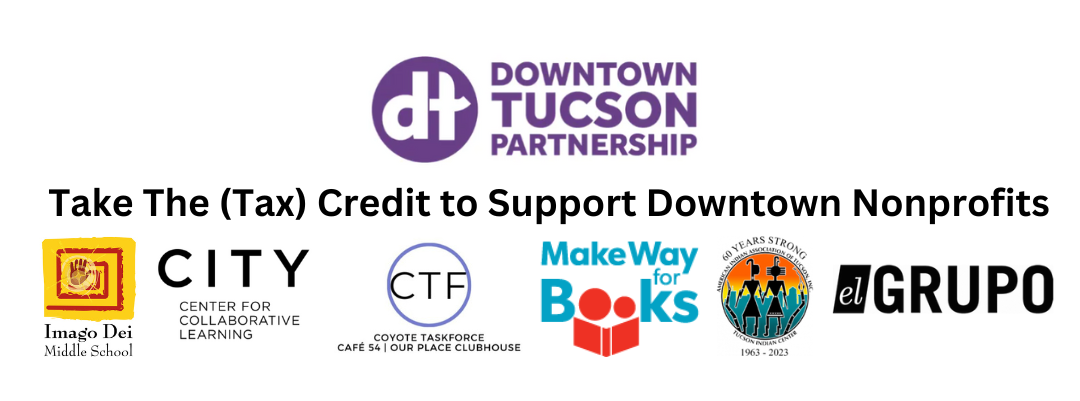Take The (Tax) Credit to Support Downtown Nonprofits
It’s finally March, the time of the year when Tucson shifts our focus from gems, minerals and rodeos over to book festivals, basketball tournaments and yes: filing our taxes.
While Ben Franklin famously quipped that death and taxes were the only sure things in life, in Arizona tax season also presents another certainty: the opportunity to support downtown Tucson nonprofits through the use of tax credits gifts, which create dollar-for-dollar reductions in state tax liability and essentially cost the donor nothing. But those tax credit gifts can be everything to the nonprofits and schools that receive them to carry on their important work in the downtown area and throughout our entire Tucson community.
Many nonprofits are located in or provide critical services in our downtown. Many of them accept one of the four major types of Arizona charitable tax credits, which are the private school tuition tax credit, the public school tax credit, the qualifying charitable organization tax credit, and the foster care organization tax credit. A key thing to remember about the four tax credits is that taxpayers can utilize ALL of them – making one type of tax credit gift does not prevent someone from doing another type as well, taking advantage of each credit’s unique gift limits.
It’s also important to remember that tax credits can be taken up to the established limits based on your state tax liability – but a taxpayer’s liability is the total amount of state tax owed based on income and other factors. Tax liability is NOT just an amount someone might still owe when they file. Most working adults pay taxes through payroll deductions or quarterly pre-payments, and with the use of tax credits, they can move dollars to a favorite nonprofit and get that money back in a refund from the state.
For Imago Dei Middle School on 6th Avenue, the private school tuition tax credit provides about 80% of the school’s operating budget, sustaining and growing their tuition-free school for children from low-income and under-resourced families. For the 2023 tax year, with filings due by April 15th, the maximum tax credit gift to Imago Dei is $1307 (for single, married filing separate, or unmarried head of household) and $2609 for married filing jointly.
According to Cameron Taylor, Head of School at Imago Dei, tax credits are the energy that fuels the school’s mission of breaking the cycles of poverty through education. But he adds that the benefit of the tax credit doesn’t just stay in the school’s classrooms.
“Private school tax credit gifts have an amplifying effect throughout downtown,” said Taylor, “and that goes beyond paying the school’s 27 employees working or living downtown. Tax credit dollars provide our school lunches catered through Johnny Gibson’s Downtown Market, they send our students to Playformance, the Tucson Museum of Art, or the Fox. Tax credits allow us to hold our own events that bring people downtown; they pay the mortgage on our building and for our parking in the Pennington Street Garage.”
Unlike the other three types of tax credits, which accept tax credit donations directly, a private school tuition tax credit must be made through a school tuition organization (STO). STOs are certified by the Arizona Department of Revenue and carry additional regulations, including a requirement that at least 90% of tax credit contributions are applied directly to scholarships. With 100% of their students being income eligible to receive these scholarships, Imago Dei receives tax credit gifts through the Arizona Episcopal Schools Foundation, also in Tucson. Tax credits supporting Imago Dei can be made at https://www.az-esf.org/donate/
Downtowners will also be familiar with CITY Center for Collaborative Learning’s two downtown schools, City High School and Paulo Freire Freedom School – Downtown, co-located on Pennington Street (with a third school, Paulo Freire Freedom School – University, operating at the Historic Y just north of downtown). Those schools accept the public school tax credit, with limits of $200/$400 for the 2023 tax year.
According to the schools, tax credit contributions support their life-changing advisory program, Intersessions, Expeditions, multi-day field trips, college tours, after school programming, access to the arts, and personalized learning supports. They describe the tax credit for public schools as “one of the best and easiest ways to support our student’s educational experiences and opportunities.”
Tax credit contributions to support City High School and the two Paulo Freire Freedom schools can be made directly at CITY Center for Collaborative Learning’s website: https://www.cityccl.org/ways-of-giving/tax-credit-contributions
Tax credit gifts don’t just support schools, of course. The third type of tax credit, the qualifying charitable organization (QCO) tax credit, is the largest in terms of the number of organizations that can receive that credit, which includes long-time downtown stalwarts like the Coyote TaskForce, Make Way for Books, Tucson Indian Center, and El Grupo Youth Cycling. The maximum QCO tax credit donation for the 2023 tax year is $421/$841.
Tax credits are a key component of giving for Coyote TaskForce, and enable more donors to give at higher levels, according to Joanna Keyl, Development Coordinator for the organization. As a QCO, donors can direct their tax dollars to Coyote TaskForce for services which benefit individuals with mental illness, a severely underserved population in Pima County. This includes program that build work skills in programs Café 54 and Our Place Clubhouse, both downtown on Pennington Street.
Keyl adds that by investing in employment support services for Arizona’s low income adults with mental illness, donors will see the benefits in our local economy, building better economic futures and improving the quality of life for CTF clients.
Coyote TaskForce provides a spectrum of employment-focused services for adults recovering from mental illness in downtown Tucson, from formal work adjustment training and job placement through Café 54, to self-directed, voluntary work activities and job development in the peer-run community of Our Place Clubhouse. CTF also teaches its own peer support class, and operates a thrift store, ReThreads (also on Pennington), through Our Place Clubhouse.
Tax credit contributions to Coyote TaskForce can be made directly at their website: https://www.ctftucson.org/tax-credit
Make Way for Books, 700 North Stone Avenue, has spent a quarter century serving our community. According to Yissel Salafsky, Chief Executive Officer at Make Way for Books, the QCO tax credit is an important contributor to their literacy efforts.
“Guided by our belief that literacy is the ultimate life, Make Way for Books has spent the last 25 years creating the rich early literacy experiences that become the building blocks for lifelong learning,” said Salafsky. “Our mission is to give all children the chance to read and succeed.”
Make Way for Books enacts this mission through free literacy programming for families and educators. They empower parents, caregivers and educators in under-served communities with the tools they need to nurture each child’s development, learning and love of reading. Helping children build strong language and literacy skills in their early years is a powerful, proven way to transform their futures. Make Way for Books is proud to share that they reach 30,000 families and educators each year, made possible through community support.
Already this year, tax credits have helped Make Way for Books serve more than 300 educators, 1400 families, and provide over 20,000 books in our community. The need is greater than ever, with one in four children in our community without access to preschool and no books at home. Tax credit contributions to Make Way for Books can be made directly at their website: https://makewayforbooks.org/donate/
Foster care organizations work city- and county-wide providing critical services, as well, and they have their own Qualifying Foster Care Charitable Organization (QFCO) tax credit, with limits of $526/$1051 for tax year 2023. Agencies eligible to receive QFCO tax credits in Tucson include Aviva Children’s Services, I Am You 360, and La Paloma Family Services.
One final word about tax credits: they can be a little confusing! But all eligible private or public schools, as well as QCOs and QFCOs, are always happy to provide additional information to help a tax credit donor navigate the system, maximizing their use of tax credits and supporting their favorite causes. The best place to start is usually on an organization’s website, or give them a call and ask to speak to the person in charge of tax credits. They will be glad you reached out with a sincere interest in supporting their mission.

